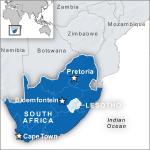March 02, 2011
In a former township outside of Cape Town, South Africa, there's a high rate of HIV infection among pregnant women. Many are unable to get the treatment they need to save their lives and the lives of their children. But that's about to change with the launch of a new project that aims to break down barriers to antiretroviral therapy.
The man in charge of the new project is Dr. Landon Myer, an associate professor based at the School of Public Health and the Desmond Tutu HIV Center at the University of Cape Town. His work centers on the community of Gugulethu.
"It's a community of about 300,000 people of predominantly low socio-economic status, who live in a context of extreme poverty and with a very high prevalence of HIV infections. So the prevalence of HIV in this setting is about 28 percent and so HIV presents an incredible problem to the community and to HIV infected women, who are pregnant, in particular," he says.
Complicated health care
Dr. Myer is the recipient of the International Leadership Award from the Elizabeth Glaser Pediatric AIDS Foundation. A $300,000 grant will fund his project. The aim to find the best strategies to allow HIV positive pregnant women to receive antiretroviral therapy.

"The underlying issue," he says, "is that lifelong antiretroviral therapy is the best form of prophylaxis or prevention of mother-to-child transmission [PMTCT] of HIV. At the same time, it's a critical intervention for the health of HIV infected mothers."
He says many HIV positive pregnant women in Gugulethu fall between the cracks of a dual health care system. A system fraught with complications and uncoordinated medical appointments.
"The existing antenatal health service, midwife obstetric units they're called, are very good at providing simple, short course antiretroviral regimens to pregnant women, who are HIV infected, but don't have advanced disease. And an entirely separate health service is focused on starting antiretroviral therapy in eligible adults, regardless of whether or not their men or women or pregnant or not pregnant. And we find that these pregnant women tend to fall between the cracks between these two very different services," he says.
That lack of coordination makes it difficult for a woman to arrange transportation, child care and time off from work. Then there are the psychological concerns of starting antiretroviral therapy during pregnancy.
Myer says, "The issues are complicated and often complicated issues require sort of holistic and multifaceted interventions."
Continental benefits
Success in Gugulethu, he says, could have wide ranging effects throughout the continent.
"If this project is really the success that I think we're all hoping it will be, we'll identify interventions, be able to identify interventions that can be generalized to other communities. Both other communities in South Africa, but other communities across sub-Saharan Africa because this is, I believe, one of the real key issues facing PMTCT and HIV care and treatment globally," he says.
Since 2002, the Elizabeth Glaser Pediatric AIDS Foundation has awarded more than $5 million in grants to 13 recipients in 9 countries as part of its International Leadership Award.